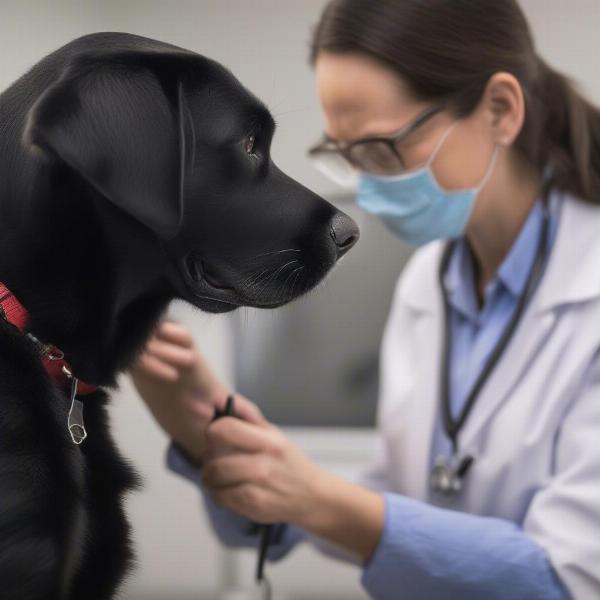Black dogs possess a unique elegance and mystery, captivating dog lovers worldwide. The term “black dog design” often refers to the aesthetic appeal of these dark-coated canines, encompassing everything from their sleek, shiny fur to their expressive, often amber eyes. But beyond their striking appearance, choosing a black dog involves considering breed characteristics, temperament, and care requirements. This article delves into the world of black dog breeds, helping you understand their specific needs and make an informed decision when welcoming a dark-furred companion into your life.
Choosing the Right Black Dog Breed for Your Lifestyle
From the playful Labrador Retriever to the dignified Black Russian Terrier, a multitude of breeds boast a beautiful black coat. Each breed, however, has distinct characteristics. Are you looking for a loyal family pet? Perhaps a vigilant watchdog is more suited to your needs. Consider your living situation, activity level, and experience with dogs.
- Family-Friendly Black Dogs: Labrador Retrievers, Newfoundlands, and Flat-Coated Retrievers are known for their gentle nature and affection for children, making them excellent family companions.
- Active Black Dogs: If you enjoy an active lifestyle, consider breeds like Belgian Shepherds (Groenendael variety), Standard Poodles (black coat), or Portuguese Water Dogs. These breeds thrive on exercise and mental stimulation.
- Guardian Black Dogs: Black Russian Terriers, Giant Schnauzers, and Rottweilers are naturally protective and make excellent guard dogs. However, these breeds require experienced owners and consistent training.
Caring for Your Black Dog: Special Considerations
While the basics of dog care remain consistent regardless of coat color, black dogs may require some specific attention. For example, their dark fur can absorb more heat, making them more susceptible to heatstroke in warm climates. Regular grooming is essential to maintain a healthy, shiny coat. Additionally, black fur can make it more challenging to spot ticks and other parasites, requiring extra vigilance during check-ups.
- Grooming: Regular brushing helps remove dead hair and dirt, preventing matting and promoting a healthy sheen.
- Sun Protection: In hot weather, limit your black dog’s exposure to direct sunlight and provide ample shade and fresh water.
- Parasite Control: Regularly check your black dog for ticks and fleas, especially after outdoor activities.
Black Dog Health and Common Concerns
Like all dog breeds, black dogs can be prone to certain health issues. Hip and elbow dysplasia, certain types of cancer, and eye problems are some potential concerns. Responsible breeding practices and regular veterinary check-ups are crucial for early detection and management of these conditions. dog black and white wallpaper
“Early detection is key to managing many health conditions,” says Dr. Emily Carter, DVM, a veterinary specialist with over 15 years of experience. “Regular check-ups and open communication with your veterinarian are vital for ensuring your black dog’s long-term health and well-being.”
 Black Dog at the Vet
Black Dog at the Vet
Training and Socialization for Black Dogs
Early socialization and consistent training are essential for all dogs, including black dogs. Positive reinforcement methods work best, rewarding desired behaviors with praise, treats, or toys. samoyed dog grooming
“Socialization is crucial for developing a well-adjusted dog,” adds Dr. Carter. “Expose your black dog to various sights, sounds, and experiences from a young age to help them become confident and well-behaved companions.”
Conclusion
Choosing a black dog is a rewarding experience. By understanding the nuances of “black dog design,” including breed-specific characteristics, grooming needs, and potential health concerns, you can provide a loving and supportive environment for your dark-furred companion. black dog teddy
FAQ
- Do black dogs shed more than other dogs? Shedding depends on the breed, not the coat color.
- Are black dogs harder to photograph? Yes, capturing their features can require adjusting camera settings.
- Are black dogs more prone to heatstroke? Their dark fur absorbs more heat, making them slightly more susceptible.
- Are black dogs more aggressive? No, temperament is determined by breed and individual personality, not coat color. how to get dog pee smell out of concrete
- What are some popular black dog breeds? Labrador Retrievers, German Shepherds, and Poodles are just a few examples.
ILM Dog is a leading international website dedicated to providing expert advice on dog care and wellbeing. From breed selection to health and training, we offer comprehensive resources for dog owners worldwide. We specialize in various aspects of dog care, including breed selection, health, training, nutrition, grooming, and product recommendations. Contact us for personalized guidance and support on your dog ownership journey. Email: [email protected] Phone: +44 20-3965-8624. Visit ILM Dog for more information.